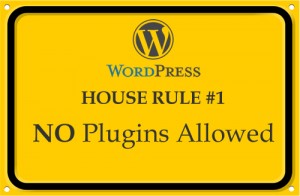I generally ensure that a site runs as few plugins as possible. Generally:
No. of plugins Rating
0-5 5-star
5-10 4-star
10-15 3-star
>15 Seriously?
This might seem to overly-simplify what is in essence a complex topic; so many other factors impact site performance. Granted. My No Plugin law though is merely a guideline to get you to deeply question whether you need to plug everything.
Almost all functionality required by an average site can be done in a few efficient lines of code in a theme’s functions.php. The kakoma.ug WordPress law of No Plugin states that:
Thou shan’t use a plugin for anything that can be done in a few lines of code in functions.php

It is imperative that I add that this law goes against the WordPress community guidelines. The community (of which I’m a part) says that presentation and functionality should be separate; themes are for presentation. I agree BUT I believe that:
- Some plugins have code that is of no use to your site. This code is run every time your site is accessed
- Some plugins don’t have good support and go obsolete when WordPress is updated
- Some are poorly coded
- Because a plugin is built to be one-size-fits-all, there are variables that are stored in the database that would give your site some relief if they were hard-coded
- Some plugins don’t play well together
All this is very subjective; if you feel a plugin will do for you then by all means, indulge. If, however, you are the kind that prefers to code things yourself and get low-hanging fruit out of the way, then this is where we explore your alternatives.
Related posts, breadcrumbs,Google Analytics code-you don’t need plugins for those. I cover how to implement each easily
All said, I do have a must-have plugin list you can check out.

2 Responses